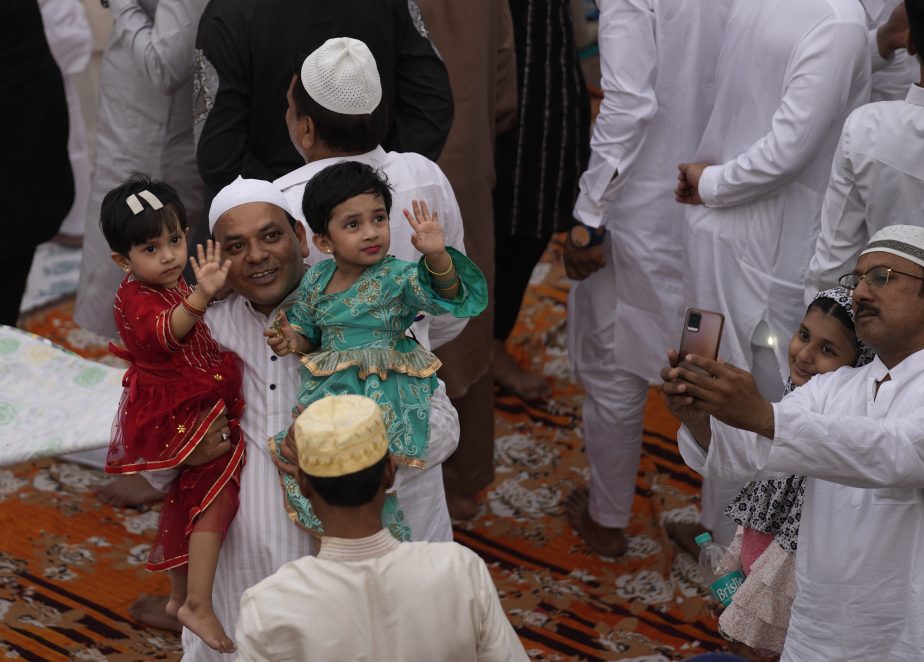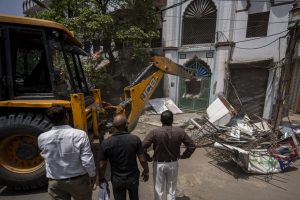The suffering of Muslims in India has reached unprecedented levels since the Hindu nationalist Bharatiya Janata Party (BJP) came to power in 2014. In addition to the demonization of the community, they are targets of mob violence and hundreds of Muslims have been killed, injured and rendered homeless. Their homes, businesses, and places of worship have been targeted by Hindutva mobs. There is a systematic attempt to deprive them of their livelihood and way of life, and to erase their place and contributions in India’s history and culture.
For millennia, India took pride in its social diversity and inclusive culture. So, what happened? How did it become the intolerant and hate-filled society that it is today? Muqtedar Khan, an Indian American academic and professor of international relations at the University of Delaware, draws on his personal experiences as a child and young adult growing up in India, and his insights as a political scientist to make sense of what is happening in India today. In an interview with Sudha Ramachandran, South Asia editor of The Diplomat, Khan says that changes to the Indian Constitution being made by the BJP government are “designed to send the signal that non-Hindu religious identities will not be tolerated.”
“There is no room for Islam and Christianity in this design of a Hindu state,” he said.
What was it like growing up as a Muslim in Hindu-dominated India in the 1980s and 1990s?
I lived the first 26 years of my life in India and the subsequent 30 in the U.S. and if I had a choice, I would still choose this combination over any other. There is a rhythm and a spiritual streak in my soul that I think is the gift of my childhood in India. My intellectual pursuits and contributions are a gift of my adulthood in the U.S.
As I reflect on my days growing up in India, through the lenses of current developments in Indian politics, I feel that I experienced the best of the communal harmony that was baked into Indian culture, and I also witnessed the emerging culture of hate and intolerance that is now so dominant.
I remember celebrating Eid and Sankranti, Holi and Ramadan with my friends and neighbors. I also remember lying in bed, with my cricket bat within reach as communal riots raged outside. I remember being told a hundred times not to trust the cops and avoid any interaction with them since they were anti-Muslim.
I remember going to the national debating championship in Delhi and meeting both Prime Minister Rajeev Gandhi and President Zail Singh. I remember actor Dilip Kumar listening to me speak at a reception in the Bombay Mayor’s house in 1979. I was a ninth grader then who was chosen to be a judge at the first children’s film festival and was visiting Mumbai for the first time. The thespian told me something about how good a speaker I was, I don’t exactly remember what he said since I was gawking at the vision standing next to him, the divine Saira Banu. I was the only Muslim judge at that festival.
I remember playing a cricket match in a Kashmiri village in 1986 and hitting the first ball of the match for a straight six. We were forced to spend a whole day outside Srinagar because the insurgency then was just beginning.
There are many bad memories too of being caught in religious violence, but I have chosen to forget them, and I try to remember the good ones, that keep me connected to the land of my birth.

An Indian Muslim holds his children after offering Eid al-Fitr prayers at the Jama Masjid in New Delhi, India, Tuesday, May 3, 2022. AP Photo/Manish Swarup
The rise of Hindutva in India has resulted in Muslims suffering horrific violence in recent decades. Did Muslims who chose to stay back in India at the time of Partition make a wrong choice?
I am firmly convinced that the creation of Pakistan was a wrong decision. One reason why India is doing so much better than Pakistan is because of its diversity, which makes its democracy a necessity. A small segment of elite Pakistanis has benefitted from the Partition but a vast majority of subcontinental Muslims on both sides of the border have suffered as a consequence of Partition and the hatred it unleashed.
The plight of Indian Muslims today is a direct consequence of the demons unleashed through the Hindutva ideology, which feeds on the past actions and atrocities of Muslim rulers like Aurangzeb and invaders like Mahmud of Ghaznavi, to advance a form of Hindu nationalism that at its core is anti-Muslim and anti-Islam, more than it is pro-Hinduism. The Partition and India’s subsequent wars with Pakistan and major terrorist attacks in India from across the border have played a major role in widening the chasm between Hindus and Muslims, to the detriment of Indian Muslims.
As for Muslims who belong to the poor classes, whether they stayed in India or Pakistan does not matter; they are poor and unsafe on either side of the border. The middle class is better off in India since the educational opportunities are better and they can benefit somewhat from India’s democracy. The very elite and rich who migrated are the only ones who may have benefitted since they can milk the Pakistani state and perpetuate their privilege.
From an inclusive society to a polarized one. India’s secular constitution is under severe threat. How did we get here? Where did India fail?
The Hindu nationalist movement – Hindutva – whose flag bearer, the BJP, has been in power in India since 2014, is determined to remake India and that necessarily includes rewriting the Indian Constitution in such a way that it privileges Hindus and Hinduism and disenfranchises Muslims and erases Islam. The abrogation of Article 370 and the rush to introduce a uniform civil code is designed to send the signal that non-Hindu religious identities will not be tolerated. Hinduism is privileged via custom and as an ancient cultural heritage of India, and both Islam and Christianity are framed as unwelcome foreign intrusions that must be purged. There is no room for Islam and Christianity in this new design of a Hindu state. Calls for a new constitution are already in the public sphere.
Two tendencies have contributed to the current situation, placing both India’s secular ethos and inclusive democracy at risk of being replaced by a majoritarian autocracy. The first is hate speech directed at Muslims that demonizes their very existence and violence perpetrated and provoked by armed Hindutva gangs like the Bajrang Dal.
These gangs also enjoy state patronage in the states ruled by BJP. The recent case of a criminal illustrates this. Monu Manesar is wanted by the police in a lynching investigation in Rajasthan and Haryana and is accused of triggering the most recent communal violence. He is easily accessible to media and appears on various media platforms, but the Rajasthan and Haryana police have been unable to apprehend him for months. But the same police, who cannot find this fugitive, demolished over 300 homes and businesses of Muslims accused of being involved in communal violence within 48 hours.
Hate speech and violence against minorities in India is now a public-private partnership. Hindutva gangs start the violence using religious processions as a pretext and the state follows up with the demolition of homes to complete the 1-2 punch. This tableau has played out in Uttar Pradesh, Madhya Pradesh and now Haryana.
The second tendency that has contributed to the situation in India today is the failure of a Hindutva-ized Indian population to say no to hate speech, polarization, demonization, and now violence. This has brought India to the brink of disaster. What we are witnessing in Manipur is just the tip of the iceberg. The whole country could become Manipur.
Why has the Muslim world turned its back on the violence Indian Muslims are being subjected to?
Muslim nations are discovering a new form of nationalism devoid of Islamic solidarity. Saudi Arabia under Crown Prince Muhammad bin Salman is pursuing policies aimed at security and economic benefit and hence is unwilling to speak to the plight of Muslim minorities, whether in India or China. The same is true for most of the Arab world. They are more interested in building strategic partnerships with these nations than in pursuing humanitarian causes. An excellent example of this new posture is the Abrahamic Accords. They are a triumph of national interests over collective interests and have come at the cost of the Palestinian cause.
Besides the discovery of narrow self-interests most Muslim nations are undemocratic themselves and are reluctant to intervene in the “internal affairs” of other nations because it places their own domestic situation open to scrutiny and criticism. They have adopted a “don’t ask don’t tell” approach to foreign policy when it comes to issues of human rights of Indian Muslims.
What are your views of the BJP government’s proposed Uniform Civil Code?
In principle, I support the idea of a uniform civil code. I live in the U.S., and it does not have religious personal laws. From the U.S. we can learn that a robust and secular freedom of religion model is sufficient. But in India, Muslims fear that the UCC is a backdoor to impose Hindu norms and values on others under the guise of uniformity. Additionally, Muslims do not trust the BJP government since they fear that this is a political ploy to heighten polarization for electoral gains in the coming national elections, which is a few months away. If the government was serious about this, they would have prepared a draft UCC and shared it with people by now.
In the absence of a good faith approach to public discourse on UCC I feel that while in principle it is a good idea, I oppose its politicization.
India, Bangladesh, and Pakistan all emerged from the horrors of Partition. Seventy-six years thereon, Pakistan lags behind them. More Muslims have died violently in Pakistan than in the other two countries. Did Jinnah’s ‘vision’ fail Pakistani Muslims?
The Partition was a catastrophe for the entire South Asia. The two-nation theory which imagined nationalism based on religious identity was disproven twice — once in 1947 when India chose to become a secular state and not a Hindu Rashtra, and again in 1971 when Bangladesh chose independence to preserve linguistic and ethnic identity, rejecting religious solidarity.
The world has seen the emergence of only two nations — Pakistan and Israel — based on religious nationalism. Both are embroiled in internal and external conflicts. Religious nationalism is a recipe for disaster and the current plight of Indian Muslims is a direct consequence of Jinnah’s vision and the emergence of copycat Hindu nationalism, which essentially embraces the same idea of religious nationalism.
In order to justify the creation of Pakistan, the idea that Hindus and Muslims cannot live together was emphasized. This idea is the raison d’etre of Pakistan. Today in order to advance peace between Hindus and Muslims, between India and Pakistan one has to deconstruct and completely negate the reason for Pakistan’s existence. Jinnah’s vision not only divided Hindus and Muslims but it has made peace between India and Pakistan impossible. For there to be peace, Pakistan must repudiate the very reason for its existence.

































